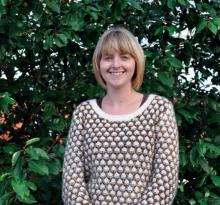Eleanor Higginson tells ialeUK about her role as a landscape ecologist at Somerset Wildlife Trust.
1. What is your job title/ who is your employer?
I am the Landscape Ecologist at Somerset Wildlife Trust. It is my responsibility to ensure that the work that we do alongside our partners across the county strengthens Somerset’s ecological networks.
2. What is your typical working day/week?
My typical working week is largely focussed on data – whether that is analysing data already collected or devising and coordinating landscape monitoring programmes which will help to focus our work. All this information goes into models which we use to represent how well connected habitats are in the county.
3. Why did this type of work interest you?
I feel that it is important to be pragmatic about land use. Not all land can be put aside for wildlife and in Somerset demands on land use include farming, quarrying and flood alleviation amongst other things. Each of these types of land use are likely to effect wildlife in some way but if we take the time to understand the impacts of land use across the landscape we can do more than alleviate the negative effects, we can create opportunities to reconnect fragmented habitats. It’s a really exciting time to be a Landscape Ecologist because the necessity of working at a landscape scale has become so widely recognised in government policy in recent years. This has led to exciting opportunities in Somerset to work with Somerset County Council and all other local planning authorities to map the components of Somerset’s ecological network so that it can be considered in strategic development planning.
4. What jobs and experience have led you to your present position?
After graduating in Zoology from Nottingham University I took up a volunteer placement with the Nottinghamshire Wildlife Trust, which was a great introduction to habitat management. From there I got a job as the Local Nature Reserves Officer at Nottingham City Council and got to grips with the realities of urban nature conservation. I then turned my attention to a more rural landscape by volunteering on organic farms for 6 months and then completing an MSc in Agriculture and Environmental Science at Newcastle University. This led me to roles at the Soil Association and as a Farm Advisor at Avon Wildlife Trust. My experience of conservation in urban and rural settings brought me to realise that although these landscapes look very different the problem of habitat fragmentation remains the same.
5. What part of this job do you personally find most satisfying? Most challenging?
The problem solving aspect of this job is the most stimulating part. I love unpicking ecological questions and trying to find a way to answer them using the resources that we have available.
6. Do you have any advice for someone interested in this field/job?
Read, read, and read! There is so much great research being carried out in this field and new theoretical models coming online all the time that you really need to make sure you are up to date with the most recent thinking. It would also be a good idea to contact organisations that have landscape scale initiatives such as the Wildlife Trust’s Living Landscape projects and volunteer to assist them with monitoring or mapping work. This way you will be able to gain a working knowledge of how practitioners are able to apply current research to their work.
Are you currently in a landscape ecology role that you would like to share with other members? Please send through your answers to the questions above and it will be published in the next newsletter
